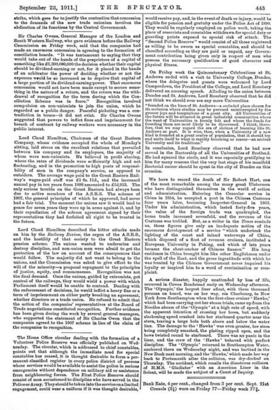Lord Claud Hamilton described the bitter attacks made on him
by the Railway Review, the organ of the A.S.R.S., and the hostility of that society to the Great Eastern pension scheme. The unions wanted to undermine and destroy discipline, and non-union men were afraid to get the protection of the law on account of the consequences that would follow. The majority did not want to belong to the unions, and the Commission was asked to give effect to the will of the minority—a proposal repugnant to the principles of justice, equity, and commonsense. Recognition was not the final demand. Once the unions, guided by extremists, got control of the railways, they would wield a power with which Parliament itself would be unable to contend. Dealing with the enforcement of decisions, he would inflict a heavy fine or a term of imprisonment on either party breaking an agreement, whether directors or a trade union. He refused to admit that the action of the companies' representatives at the Board of Trade negotiations constituted recognition. Further evidence has been given during the week by several general managers, who supported the statement of Sir Charles Owen that the companies agreed to the 1907 scheme in lieu of the claim of the companies to recognition.






































 Previous page
Previous page